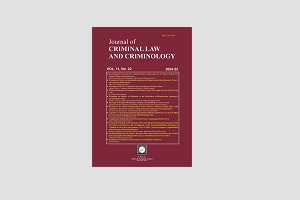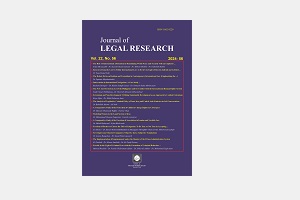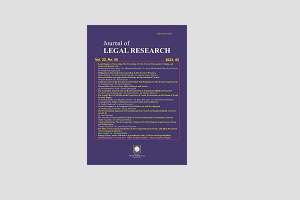Journal of
LEGAL RESEARCH
Number 48
Vol. XIX ● No. 4
autumn 2021
Managing Editor: Vahid Eshtiagh
Editor-in-Chief: Seyyed Ghasem Zamani
CONTENTS
USA Unilateral coercive measures against Iran from the perspective of International Law by emphasizing of UN Human Rights Council Practice
Dr. Seyyed Ghasem Zamani – Zeinab Farahmandzad
Occurrence of Crime on the High Seas; from Exercising Coastal State’s Criminal Jurisdiction to its Prohibition in the ITLOS’s Jurisprudence
Dr. Javad Salehi
Application of Article 79 of the Rules of Procedure of the International Court of Justice in Jurisprudence
Dr. Abbas Barzegarzadeh
Domestic and International Banking Disputes Resolution Mechanism
Dr. Mansour Atasheneh – Dr. Seyed Alireza Hashemizade – Zahra Atasheneh
Feasibility Study of the Simultaneous Claim of Obligations Documented in the Executory Document from the Competent Authorities in the Light of Review of Laws Jurisprudence and Legal Doctrine
Soroush Safizade
Analysis of Laws and Regulations Related to Payments to the Board of Directors with Emphasis on the Direct Tax Law
Dr. Roohalah Seddighi – Hasan Saffari
E-parliament and its role in the realization of democracy
Sevda Amiri Zargabad – Dr. Seyed Hossein Malakouti Hashtjin
The Effect of the Principle of Precedence of the Jurisdiction of the Administrative Courts in the Realization of Justice in France; A Look at its Implementation in the Iranian Administrative Law System
Mohammad Naderifard – Dr. Mohammadreza Mojtehedi – Dr. Abolfazl Ranjbari
Discussion of Criminal Policy in Cont’s Code
Dr. Jamal Beigi – Shirin Rahimi
Articles
USA Unilateral coercive measures against Iran from the perspective of International Law by emphasizing of UN Human Rights Council Practice
Dr. Seyyed Ghasem Zamani
Professor, Department of Public and International Law,Faculty of Law and Political Science, University of AllamehTabataba’ee, Tehran, Iran, Corresponding Author.
Email: zamani@atu.ac.ir
&
Zeinab Farahmandzad
Ph.D. Student in International Law, Faculty of Law and Political Science, University of AllamehTabataba’ee, Tehran, Iran.
Email: farahmandzad3@gmail.com
ABSTRACT:
Unilateral sanctions are examples of unilateral coercive measures that have been discussed in numerous international documents because of their extensive implications for human rights. This descriptive-analytical article seeks to explain that the US government is in some cases internationally responsible for human rights abuses and violations of treaty and customary obligations due to unilateral and extraterritorial sanctions against the Iranian government and individuals. The reports of the special reporters of the Human Rights Council on the negative effects of unilateral coercive measures on human rights has been examined in this research. The results of the study indicates the need to establish a coherent international mechanism to record unilateral coercive measures of states and periodic reports of targeted states on the human rights effects of sanctions on their citizens as well as the establishment of a specialized tribunal under the auspices of the United Nations Security Council to refer individuals and institutions affected by unilateral sanctions and to compensate them.
Keywords: Unilateral coercive measures, Unilateral sanctions, Compensation , Human Rights Council, International responsibility.
Occurrence of Crime on the High Seas; from Exercising Coastal State’s Criminal Jurisdiction to its Prohibition in the ITLOS’s Jurisprudence
Dr. Javad Salehi
Associate Professor, Department of Law, Faculty of Law and Social Sciences, Payam-e-Noor University, Tehran, Iran.
Email: Javadsalehi@pnu.ac.ir
ABSTRACT:
Components of states’ criminal jurisdiction are based on domestic criminal law that has been mandated by legislative will. But this situation in relation to the criminal jurisdiction of the Coastal State is subject to restrictions that apply to division of maritime areas. The ITLOS’s jurisprudence is an example of the obligation to comply with the components of the Coastal State’ criminal jurisdiction in the High Seas that do not precede record. The review of the ITLOS’s jurisprudence is important in this regard, the subject and purpose of this paper and have new achievements that have been considered by descriptive-analytical method of the provisions of the UNCLOS. The main question of this study is what are the components of the prohibition of the High Seas’ criminal jurisdiction in the ITLOS jurisprudence? The findings of the study show that the criminal jurisdiction of the Coastal State faces some limitations as a result of the provisions of the UNCLOS. Transferring of absolute jurisdiction over the affairs of a foreign ship to its Flag State in the High Seas is an example of these restrictions. Accordingly, the Coastal State cannot prosecute foreign ship’s offenses in the High Seas based on the ITLOS’s jurisprudence.
Keywords: Coastal State, Flag State, Criminal Jurisdictionin, Offenses in High Seas, Right of Freedom of Navigation.
Application of Article 79 of the Rules of Procedure of the International Court of Justice in Jurisprudence
Dr. Abbas Barzegarzadeh
Assistant Professor, Department of Public International Law, Faculty of Law, Bushehr Branch, Islamic Azad University, Bushehr, Iran.
Email: abbasbarzegar60@gmail.com
ABSTRACT:
Article 79 of the Rules of Procedure of the International Court of Justice deals with the subject of preliminary objections. Preliminary objections refer to two types of objections related to competence and audibility. Articles 34 and 36 of the Statute deal with the jurisdiction of the Court, but there are ambiguities regarding the hearing, the Statute and the Rules of Procedure of the Court, in the sense that its instances have not been specified. In this descriptive-analytical study, we seek to determine the cases of inability to hear the petition in the court proceedings. . In cases where the lawsuit is filed through a lawsuit, it is very common for the defendant government to raise preliminary objections. Such objections are designed to prevent the court from issuing a ruling on the nature of the dispute According to the Court’s case, cases of inadmissibility include abuse of rights, lack of dispute, lack of interest, political disputes, diplomatic protection, other dispute resolution methods, fictitious disputes, the need for judicial observance, and abuse of court. Cases such as lack of legal capacity to file a lawsuit and the unreality of the dispute have sometimes been cited in the lawsuit, as well as the unscrupulousness of the plaintiff, whose examples (not the principle) have not been accepted by the court in any case.
Keywords: International Court of Justice, Judicial Procedure, Jurisdiction, Hearing, Article 79 of the Rules of Procedure.
Domestic and International Banking Disputes Resolution Mechanism
Dr. Mansour Atasheneh
Assistant Professor, Department of Law, Faculty of Economic and Social Sciences, Shahid Chamran University of Ahvaz, Ahvaz, Iran.
Email: mansour.atasheneh@scu.ac.ir
Dr. Seyed Alireza Hashemizade
Assistant Professor, Department of Law, Faculty of Law and Political Sciences, Islamic Azad University, Karaj Branch, Alborz, iran.
Email: hashemy@yahoo.com
Dr. Zahra Atasheneh
Ph.D. Student, Faculty of Law and Politics Faculty, Islamic Azad University, Karaj Branch, Alborz, Iran, Corresponding Author.
Email: zahra.atasheneh@yahoo.com
ABSTRACT:
The importance of trade and business relations in human life and the economic growth of society is quite clear and obvious. Commercial law is responsible for regulating these relations through the provision of various commercial contracts. One of the types of these important commercial contracts is the banking contract, which has maintained its commercial nature despite the fact that some banks are state-owned. The settlement of banking disputes was originally subject to general rules and was sometimes proceeded merely by justice courts. But now, with the dominance of the market-based economy system, alternative methods such as arbitration, negotiation, mediation, good office, conciliation and expert advice in the domestic and international arenas are increasingly used for resolving disputes. These mechanisms, which have also been interpreted as private justice, have special advantages and privileges over the traditional judicial system, which are effective in speeding up the settlement of disputes in line with the speed required by business. In the international arena, issues Such as the tendency of traders to be aware of their rights and obligations, the disinclination to engage with the complex and unknown rules and procedures of other countries’ courts, and the avoidance of challenges related to conflict-of-laws rules have caused the reference to settlement mechanisms condition in most commercial contracts. Therefore, the present research is dedicated to investigating the mechanisms of resolving domestic and international banking disputes.
Keywords: Banking Contracts, Banking Disputes, Settlement Mechanisms, Judicial System, Domestic and International Disputes.
Feasibility Study of the Simultaneous Claim of Obligations Documented in the Executory Document from the Competent Authorities in the Light of Review of Laws Jurisprudence and Legal Doctrine
Soroush Safizade
Ph.D. Student in Private law, Faculty of Law, University of Tehran (Farabi Campus),Qom ,Iran.
Email: safizade.soroush@ut.ac.ir
ABSTRACT:
Simultaneous claims of debts documented in the executory document are among the common cases in the Iranian judicial system, which are carried out by obligees with motives such as pressuring the debtor to perform the debt, speeding up the collection of claims, and etc. In this regard, sometimes the whole debt is demanded from two authorities simultaneously , and sometimes debt is divided into two parts, and each part is demanded from a authority.
However,the legal status of this obligee’s measure in the Iranian legal system is unclear due to the existence of conflicting views in the dimensions of legislative, judicial and legal doctrines. Some have taken this measure as correct and others have ruled that the obligee has no authority to demand it simultaneously.
Based on this, the question can be raised that in the Iranian legal system, what are the limits of the authorities of the obligee in claiming the obligations documented in the executory document? And in particular, what effect does the pursuit of the obligations contained in the executory document through a competent authority have on the possibility of pursuing simultaneously in another authority?
This research with a descriptive-analytical method and based on documentary-library studies, has concluded that obligee’s measure in simultaneous claim is unjustifiable on the basis of legal theories and cannot be correct. Accordingly, due to lack of comprehensiveness and lack of explicit legislation, it has submitted proposals to amend the applicable regulations.
Keywords: Executory Document, Simultaneous Claim, Part-Part Claim, Novation, Release.
Analysis of Laws and Regulations Related to Payments to the Board of Directors with Emphasis on the Direct Tax Law
Dr. Roohalah Seddighi
Assistant Profosser, Department of Accounting, Faculty of Management and Accounting, Allameh Tabataba’i University, Tehran, Iran.
Email: r.seddighi@atu.ac.ir
Hasan Saffari
M.A. Student in Management Accounting, Faculty of Management and Accounting, Allameh Tabatabai University, Tehran, Iran.
Email: Hasan.saffari95@gmail.com
ABSTRACT:
Explaining the rules and regulations on payments of the board of directors in companies is very important for determining the legal duties of companies. In addition to the theoretical aspect, this issue has a wide range of practical effects on the companies. In this study, first, by examining the theories of relationship between the board of directors and the company, the nature of the legal relationship of the board of directors with the company is explained. According to various theories, there are four types of relationships for the board of directors with the company. 1) According to attorney theory, they are attorney of the company. 2) According to another theory, they are Legal agent of the company. 3) Some jurists consider the board of directors as employee of company. 4) And finally, the Organ theory that consider the board as a Pillar of the company. After rejecting the first three theories, the organ theory is accepted as a type of relationship between the board of directors and the company. Then, according to this theory, the analysis of executive circular and legal article related to the payments of the board of directors in the commercial law, direct tax law, labor law, social security law and unemployment insurance law has been done. Based on this analysis, it was found that the executive circular in some cases contradict with the relevant laws. Therefore, according to the importance of joint stock companies and the role of the board of directors in leading them, it is necessary to review and integrate the proposed laws.
Keywords: Board of Directors, Commercial Law, Direct Tax Law, Labor Law, Social Security Law.
E-parliament and its role in the realization of democracy
Sevda Amiri Zargabad
Ph.D. Student in Public Law, Faculty of Law and Social Sciences, University of Tabriz, Tabriz, Iran, Corresponding Author.
Email: sevdaamiri20202020@gmail.com
&
Dr. Seyed Hossein Malakouti Hashtjin
Assistant Professor, Department of Public Law, Faculty of Law and Social Sciences, University of Tabriz.
Email: malakooti@tabrizu.ac.ir
ABSTRACT:
In this century, the parliament is trying to use new technologies to achieve its goals. These goals include transparency, engagement, and participation in parliamentary processes, both oversight and legislative. Electronic parliament is a new form of parliament that seeks transparency in parliamentary activities by using information and communication technologies. The main purpose of e-parliament is to provide an effective solution to improve the performance of this institution. Improving the performance of this institution can provide a platform for the realization of e-democracy. The role that information and communication technologies play in relation to e-democracy is varies according to the traditional form of democracy. Therefore, in order to achieve e-democracy, the parliament should be equipped with modern electronic tools to be able to achieve e-democracy in society. One of the reasons for the tendency of societies to indirect democracy has been the impossibility of gathering people to express their views and also to participate in legislation. Thus, e-democracy can lead to the realization of direct democracy in political processes. In this article, by examining the concept of e-parliament, its role in achieving e-citizen participation as an essential element of democracy has been examined. The main purpose of this study is to introduce new electronic parliamentary tools to achieve digital democracy in society.
Keywords: E-participation, E-parliament, E-democracy, Citizens, E-tools.
The Effect of the Principle of Precedence of the Jurisdiction of the Administrative Courts in the Realization of Justice in France; A Look at its Implementation in the Iranian Administrative Law System
Mohammad Naderifard
Ph.D. Student in Public Law, Faculty of Law, Tabriz Branch, Islamic Azad University, Tabriz, Iran.
Email: naderifard393@gmail.com
Dr. Mohammadreza Mojtehedi
Professor, Department of Law, Faculty of Law and Social Sciences, University of Tabriz, Tabriz, Iran, Corresponding Author.
Email: mojtehedi@tabrizu.ac.ir
Dr. Abolfazl Ranjbari
Assistant Professor, Department of Law, Faculty of Law, Tabriz Branch, Islamic Azad University, Tabriz, Iran.
Email: a.ranjbari@tabrizau.ac.ir
ABSTRACT:
Existence of judicial supervision,trial and control of administrative and decision-making actions and decisions, both governmental and non-governmental,is one of the important and vital pillars in a healthy and efficient management.The duties of public officials and institutions should be clarified and social justice should be established.In the legal system of most countries,the view is accepted that this supervision should be done by a non-executive body,which in France is controlled by the State Council and in the Iranian legal system by the Court of Administrative Justice. Administrative law as a social science must move with historical and social developments and based on theories such as public services and having an independent judge and knowledge of administrative law;There is no need for the court to define the jurisdiction of the court and it is up to the judge to determine whether an action is a public service or not;Be open.The transfer of jurisdiction over government and municipal regulations in the Administrative Court of Justice seems to have no solid basis because of adverse consequences such as the impossibility of decompression from the Court of Administrative Justice,the impossibility of appealing the decisions of the General Assembly, the impossibility of categorizing national and local lawsuits. Approvals have a position in terms of the position of the legislator.However,a look at Iran’s comparative administrative law with France shows that approvals in France,contrary to the Iranian legal system,are usually divided into national and local,and the assignment of local approvals is left to local authorities,Also,the consideration of important approvals has been distinguished from other cases.It is sometimes implemented in the Iranian legal system.
Keywords: Court of Administrative Justice,Government Council, Government and Non-Governmental Institutions,Comparative Administrative Law, Public Services.
Discussion of Criminal Policy in Cont’s Code
Dr. Jamal Beigi
Associate Professor, Department of Criminal Law and Criminology, Faculty of Humanities, Maragheh Branch, Islamic Azad University, Maragheh, Iran, corresponding author
Email: jamalbeigi@iau-maragheh.ac.ir
&
Shirin Rahimi
Ph.D. Student in Criminal and Criminology, Faculty of Humanities, Maragheh Branch, Islamic Azad University, Maragheh, Iran
Email: rahimei.law@gmail.com
ABSTRACT:
Criminal policy is one of the most important branches of criminal science, which over time has provided a more complete and comprehensive concept than before. The criminal policy of any country should be sought in its criminal cycle, which looks at the three stages of legislative valuation, violation of values, and finally the reaction of society to violators of criminal law. The purpose of this article is to explain policy strategies in the discourse of Kent law based on modern criminal policy studies. The present article has been written based on descriptive and analytical methods and by reviewing the book of Kent law, based on library sources. The results of the consideration of the authorities and policy-making tools in Article 58 of this law indicate that the police have played a full and repressive role; Because the criminal policy of that code is derived from the Roman-German legal system, and as a modern criminal procedure where all police actions and activities are under the jurisdiction of the judiciary, the powers of the police are not limited. According to the findings of this study, preventive and supportive strategies in the discourse of Kent’s criminal policy have rarely been proposed and repressive measures have played an important role in his thought. It is clear that the government of the time was also a monarchy and all oversight was independent of the king himself.
Keywords: Criminal Policy, Kent law, Prevention, Criminality, Repression.





